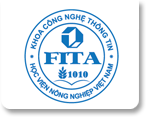Seminar Bioeconomy at BOKU: Fostering Vietnam-Austria collaboration
As climate change intensifies, the global shift towards a sustainable, bio-based economy has gained significant momentum. To address this pressing issue, the University of Natural Resources and Life Sciences, Vienna (BOKU) and Vietnam National University of Agriculture (VNUA) recently organized a seminar titled “Bioeconomy at BOKU: Scientific and Technological Aspects.”
The seminar brought together renowned scientists, researchers, and students from both institutions to explore the latest advancements in bioeconomy research. By fostering collaboration and knowledge exchange, the event aimed to contribute to the development of sustainable solutions for global challenges.
The seminar featured deligation from BOKU, including Prof. Doris Damyanovic, Vice-Rector for Teaching, Continuing Education, and Students; Prof. Christian Obinger, Vice-Rector for Research and Innovation; Prof. Dietmar Haltrich, Head, Department of Food Science and Technology; Prof. Clemens Peterbauer, Deputy Head, Department of Food Science and Technology; Prof. Stephan Hann, Head, Department of Chemistry; and Dr. Martin Altvater Senior Scientist at the Institute of Microbiology and Microbial technology.
Representing VNUA were Assoc. Prof. Dr. Nguyen Viet Long, Director of the International Cooperation Office; Assoc. Prof. Dr. Nguyen Hoang Anh, Dean, Faculty of Food Technology; along with lecturers and students from the faculties of Food Technology, Biotechnology, and Economics and Management.
Assoc. Prof. Dr. Nguyen Hoang Anh opened the seminar with a welcoming speech, highlighting the long-standing cooperation between BOKU and VNUA and extending a warm welcome to the BOKU professors, lecturers, and students in attendance. Following this, Prof. Christian Obinger, BOKU’s Vice-Rector, presented an overview of BOKU’s history, mission, vision, specialized faculties, and training programs, underscoring BOKU’s commitment to advancing bioeconomy research and education.
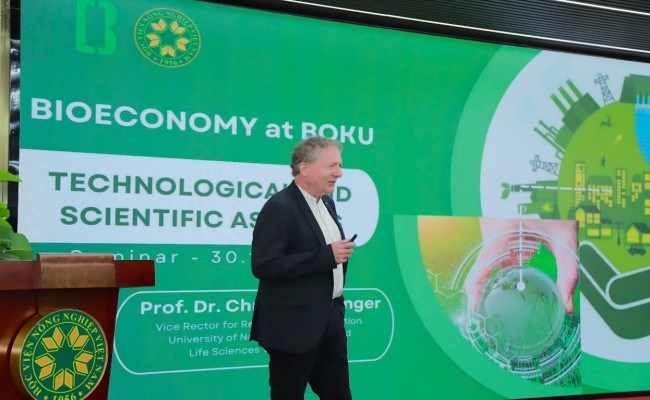 |
| Prof. Christian Obinger presents the content of Bioeconomy at BOKU |
BOKU is actively advancing research and education initiatives to lead innovation and development in the field of bioeconomy. The bioeconomy initiative at BOKU emphasizes the transformation of economic systems towards renewable resources and sustainable practices, addressing global issues like climate change, biodiversity loss, and resource scarcity.
BOKU’s comprehensive approach includes six key fields of competence essential to advancing a circular bioeconomy. These fields are ecosystem management and biodiversity, agricultural production and food, sustainable materials and technologies, biotechnology, landscapes and infrastructure, and resources and social dynamics. With over 80% of its institutes actively contributing to bioeconomy research and education, BOKU has positioned itself as a leader in sustainability-focused science in Europe.
At the heart of these efforts is the BOKU Centre for Bioeconomy, directed by Dr. Martin Greimel, which spearheads research, education, and innovation projects. The center’s goals align with transforming the economy by focusing on bio-based materials, recycling, and sustainable processes that reduce dependency on fossil fuels. BOKU is further committed to collaboration within European networks, including ICA, the Euroleague for Life Sciences (ELLS), and the European Bioeconomy University Alliance, creating cross-sector partnerships to foster bioeconomic progress throughout Europe.
BOKU’s research portfolio highlights numerous innovative projects in bioeconomy including Microbial Biotechnology; Biochemistry and Environmental Biotechnology focused on enzymatic processes; Cellulose-Based High-Tech Materials, Wood Technology involves characterizing wood quality and developing processes for biobased materials that extend wood’s functional applications in eco-friendly products; Green Civil Engineering including optimized timber structures, automated building techniques, and recycling-oriented designs that align with future environmental demands.
Through these comprehensive programs and partnerships, BOKU is shaping the future of bioeconomy by integrating scientific, technical, and economic perspectives, as well as fostering behavioral changes for a sustainable society.
Prof. Christian Obinger’s presentation captured the attention of participants, sparking questions and a lively discussion focused on gaining deeper insights into research directions and exploring the potential for applying bioeconomy concepts in Vietnam.
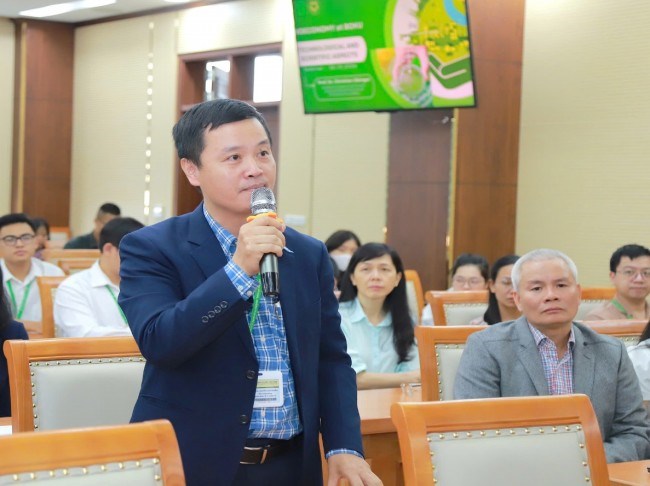 |
| Participant Discussion |
The seminar also featured a presentation by Prof. Clemens Peterbauer, who highlighted several funding opportunities for research and study in Austria, specifically for Vietnamese scholars. Key programs discussed included the Ernst Mach Grant (both worldwide and ASEA-UNINET), as well as Project 89 from the Ministry of Education and Training Vietnam. Additionally, ASEA-UNINET supports collaborative projects that address local challenges and advance sustainable development goals, offering funding of up to €50,000.
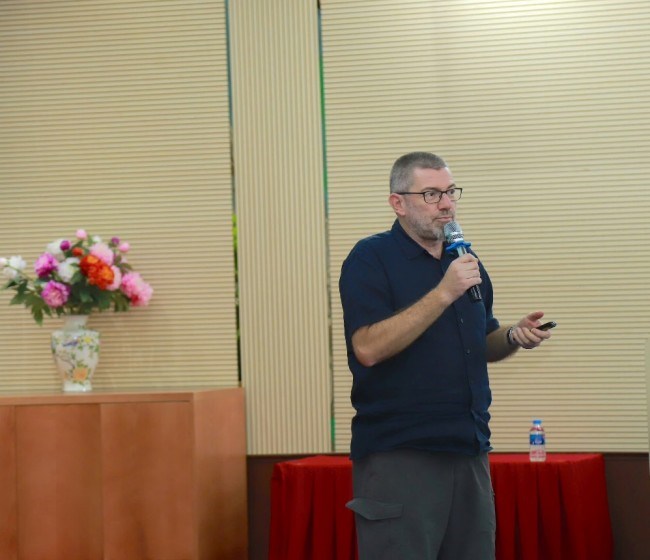 |
| Prof. Clemens Peterbauer presents study and research scholarships |
The seminar proved to be a significant milestone, forging stronger ties between BOKU and VNUA. By showcasing cutting-edge research in bioeconomy, the event inspired participants to explore innovative solutions for sustainable development. Furthermore, the seminar offered practical advice on securing funding, enhancing educational programs, and strengthening international research collaborations.
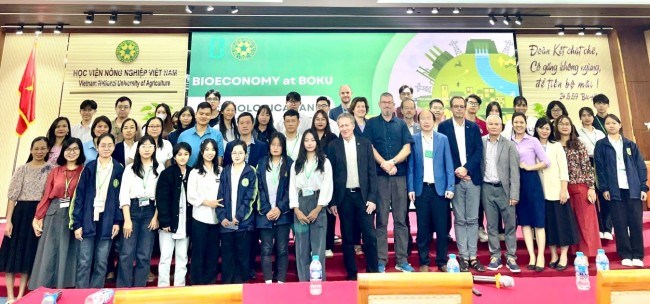 |
| Commemorative photo of the seminar |
Research Group on Food Safety and Microbiology
